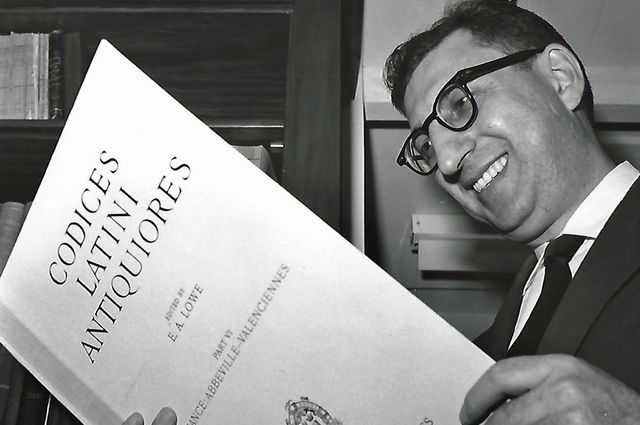
Philip Levine, professor emeritus of classics at UCLA and an expert in Latin literature and manuscripts, died on Nov. 25. He was 96.
Levine’s research focused on the twin fields of philology and paleography, traditional disciplines in the study of classics. The former is the study of language in its broadest sense, its historical development, rules of grammar and syntax, and richness of vocabulary; the latter is the critical investigation (deciphering, dating and translating) of mostly parchment manuscripts that transmitted the ancient texts to the post-classical world. His Harvard dissertation focused on the calligraphy of late antique and medieval manuscripts found in the northern Italian town of Vercelli, and to this day the UCLA Department of Classics keeps his photographic facsimiles of these manuscripts.
Born Sept. 8, 1922, in Lawrence, Massachusetts, Levine was the youngest of three children born to Samuel Levine and Jennie Dekark Levine — Jewish immigrants from Russia who later met and married in the United States. Levine grew up deeply religious and very poor, a child of the Great Depression. He graduated from Harvard University (the only school to which he applied, and, he admitted years later, mostly because of its proximity to home) with an A.B. in classics. The outbreak of World War II interrupted his education, and after three years of service in military intelligence as an interrogator in Europe, he earned his degree. Originally intending to study mathematics, he found his passion inspired by his Greek teacher, the renowned classicist Werner Jaeger.
Levine came to UCLA in 1961 and he later served twice as department chair and dean for the division of humanities in the UCLA College from 1965 until 1983. During his tenure as dean, UCLA grew to become one of the nation’s top-ranked research universities, gaining a well-respected reputation in the humanities, and especially in foreign languages. He also took a keen interest in the classics department’s graduate program. The central features of UCLA’s master of arts program in classics today follows the basic principles he first outlined in the early 1980s.
After his service as dean, Levine returned to full-time teaching; courses on the lyric poets Catullus and Horace and Latin prose composition (this last the bane of many undergraduates and graduates alike) were his particular delight. As an instructor at Harvard, he started his practice of keeping three-by-five cards for every student he taught in a Greek or Latin course, asking them at the start of class to inscribe their name, address and previous coursework. Years later, when several of these former students became distinguished scholars and lectured at UCLA, he gleefully brought out his old file cards and reminded them of their undergraduate years (and sometimes grades).
Among his academic honors, Levine was a Guggenheim Fellow and Fulbright Research Scholar in Italy. He received the Bromberg Award for the Humanities, Cavaliere dell’Ordine al Merito della Repubblica Italiana, and an honorary doctor of Hebrew letters from the University of Judaism. He was also the John and Penelope Biggs Resident in the Classics at Washington University. In 1998, he received the Emeritus of the Year at UCLA for recognition of his continued service in what he joyfully deemed “the blissful state of emeritude.”
Levine is survived by his sons, Jared (Lucy) Levine and Harlan (Tracy) Levine, both graduates of Harvard University, and his grandchildren Zachary, Zane, Zoe and Hannah.

